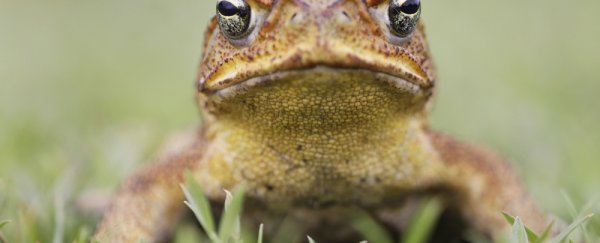Australian researchers have found that cane toads - one of our most invasive pests - are wiping out dung beetles, and, in turn, disturbing the process that keeps parasite-filled dung from piling up around the countryside.
Dung beetles are one of Australia's few introduced species success stories. They were brought into the country during the '60s to help control the amount of dung on cattle stations, and have since done a great job of keeping flies and worms, which pose health risks to livestock, at bay. But now cane toads threaten to ruin that balance.
The good news is a project conducted by the University of New South Wales and the Hawkesbury Institute for the Environment at the University of Western Sydney suggests that water could be the key to keeping the cane toads off farmland and away from dung beetles.
"Cane toads are major predators of dung beetles," Mike Letnic from UNSW told Jessica Kidd for ABC News. "What they do at night is just sit themselves on a freshly-deposited dung pat and they'll eat all the dung beetles … We've found cane toads with up to 150 dung beetles in their stomach, so basically that's 150 dung beetles in a sitting they're consuming."
But Letnic and Hawkesbury Institute for the Environment PhD student, Ben Feit, have discovered that the water source a farmer has on their property - closed water tanks or open dams - can greatly affect the balance of cane toads and dung beetles. In fact, there's a direct correlation between having access to open water and the number of cane toads on a property.
"The numbers of cane toads at dams where cane toads can access open water were about 6.4 times higher than the cane toad abundance found at tanks," Feit told the ABC. "Dung beetles in turn were about 9.6 times lower in abundance at dams than at tanks. The availability of free water increases the abundance of cane toads and that has negative impacts on dung beetle abundance."
 Ben Feit
Ben Feit
This means that at farms with open dams, a build up of dung and associated flies and parasites could be expected. "That ultimately would lead to a loss in cattle production and would translate into money loss for landholders and cattle farmers," Feit said.
The research isn't just of interest to farmers; it also suggests that if we could cut off access to water, we could help stop the spread of cane toads, which has managed to make their way south across the New South Wales border in the 2000s.
The team now suggests that farmers look into converting their dams systems to water tanks. "It's something that could be done strategically in places to prevent the spread of cane toads," Letnic told Kidd at the ABC. "But there are also other savings - the sorts of water storage systems we're proposing are actually more efficient, so they use less fuel because there's less losses of water due to evaporation and seepage."
Anything that saves water, reduces flies and stops the spread of cane toads is a good idea in our book.
Love the environment? Find out more about how you can have a career protecting it with the Hawkesbury Institute for the Environment.
